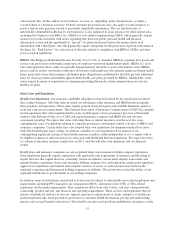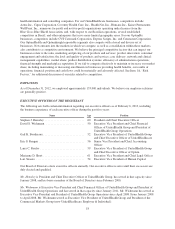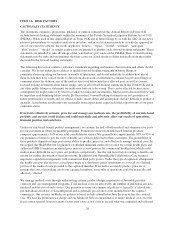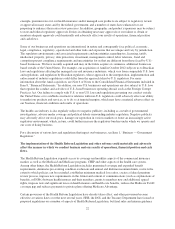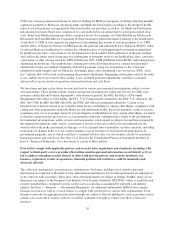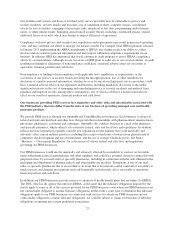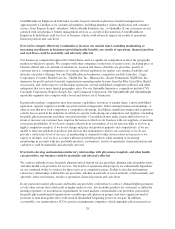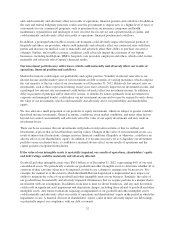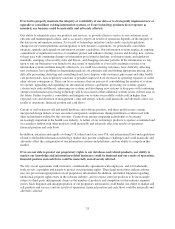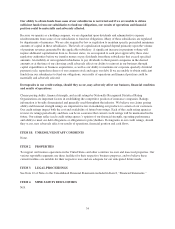United Healthcare 2012 Annual Report Download - page 27
Download and view the complete annual report
Please find page 27 of the 2012 United Healthcare annual report below. You can navigate through the pages in the report by either clicking on the pages listed below, or by using the keyword search tool below to find specific information within the annual report.As a result of our participation in various government health care programs, both as a payer and as a
service provider to payers, we are exposed to additional risks associated with program funding,
enrollments, payment adjustments, audits and government investigations that could materially and
adversely affect our business, results of operations, financial position and cash flows.
We participate in various federal, state and local government health care coverage programs, including as a payer
in Medicare Advantage, Medicare Part D, various Medicaid programs, CHIP and our TRICARE West contract
with the DoD, and receive substantial revenues from these programs. We also provide services to payers through
our Optum businesses. These programs generally are subject to frequent changes, including changes that may
reduce the number of persons enrolled or eligible for coverage, reduce the amount of reimbursement or payment
levels, reduce our participation in certain service areas or markets, or increase our administrative or medical costs
under such programs. Revenues for these programs are dependent upon periodic funding from the federal
government or applicable state governments and allocation of the funding through various payment mechanisms.
Funding for these government programs is dependent upon many factors outside of our control, including general
economic conditions and budgetary constraints at the federal or applicable state level, and general political issues
and priorities. For example, CMS has in the past reduced or frozen Medicare Advantage benchmarks and
additional cuts to Medicare Advantage benchmarks are expected in the next few years. Although we have
adjusted members’ benefits and premiums on a selective basis, terminated benefit plans in certain counties, and
intensified both our medical and operating cost management in response to these benchmark reductions, there
can be no assurance that we will be able to execute successfully on these or other strategies to address changes in
the Medicare Advantage program. A reduction or less than expected increase, or a protracted delay, in
government funding for these programs or change in allocation methodologies may materially and adversely
affect our results of operations, financial position and cash flows.
Under the Medicaid Managed Care program, state Medicaid agencies are periodically required by federal law to
seek bids from eligible health plans to continue their participation in the acute care Medicaid health programs. If
we are not successful in obtaining renewals of state Medicaid Managed Care contracts, we risk losing the
members that were enrolled in those Medicaid plans. Under the Medicare Part D program, to qualify for
automatic enrollment of low income members, our bids must result in an enrollee premium below a regional
benchmark, which is calculated by the government after all regional bids are submitted. If the enrollee premium
is not below the government benchmark, we risk losing the members who were auto-assigned to us and we will
not have additional members auto-assigned to us. For example, we lost approximately 470,000 of our auto-
enrolled low-income subsidy members in 2012 because certain of our bids exceeded thresholds set by the
government. In general, our bids are based upon certain assumptions regarding enrollment, utilization, medical
costs, and other factors. In the event any of these assumptions are materially incorrect, either as a result of
unforeseen changes to the Medicare program or other programs on which we bid, or our competitors submit bids
at lower rates than our bids, our results of operations, financial position and cash flows could be materially and
adversely affected.
Many of the government health care coverage programs in which we participate are subject to the prior
satisfaction of certain conditions or performance standards or benchmarks. For example, as part of the Health
Reform Legislation, CMS has developed a system entitling plans that meet certain quality ratings at the local
plan level to various quality bonus payments. In addition, under the Health Reform Legislation, Congress
authorized CMS and the states to implement MME managed care demonstration programs to serve dually
eligible beneficiaries to improve the coordination of their care. Health plan participation in these demonstration
programs is subject to CMS approval of specified care delivery models and the satisfaction of conditions to
participation, including meeting certain performance requirements. Any changes in standards or care delivery
models that apply to government health care programs, including Medicare, Medicaid and the MME
demonstration programs for dually eligible beneficiaries, or our inability to meet government performance
requirements or to match the performance of our competitors could result in limitations to our participation in or
exclusion from these or other government programs, which in turn could materially and adversely affect our
results of operations, financial position and cash flows.
25


